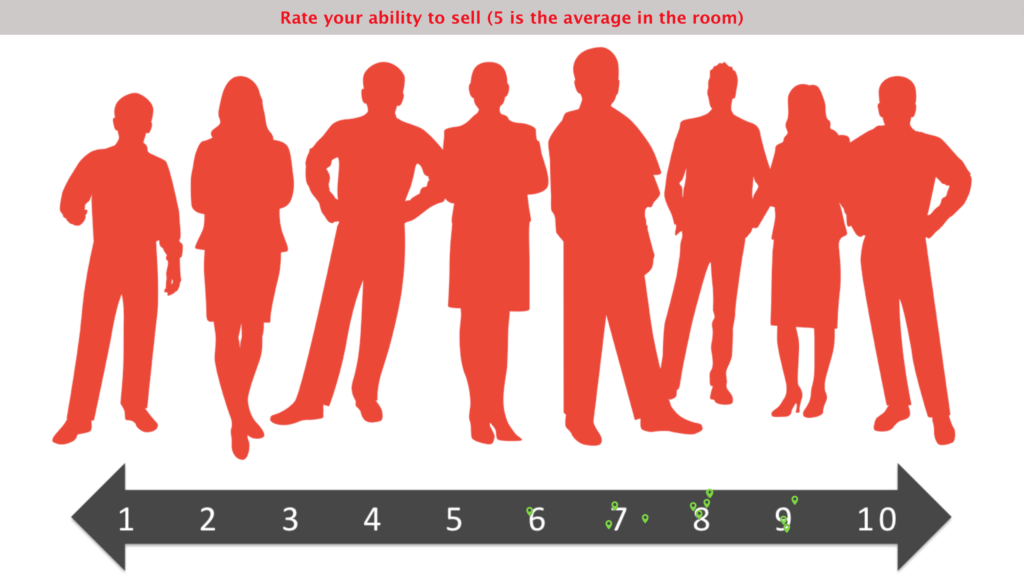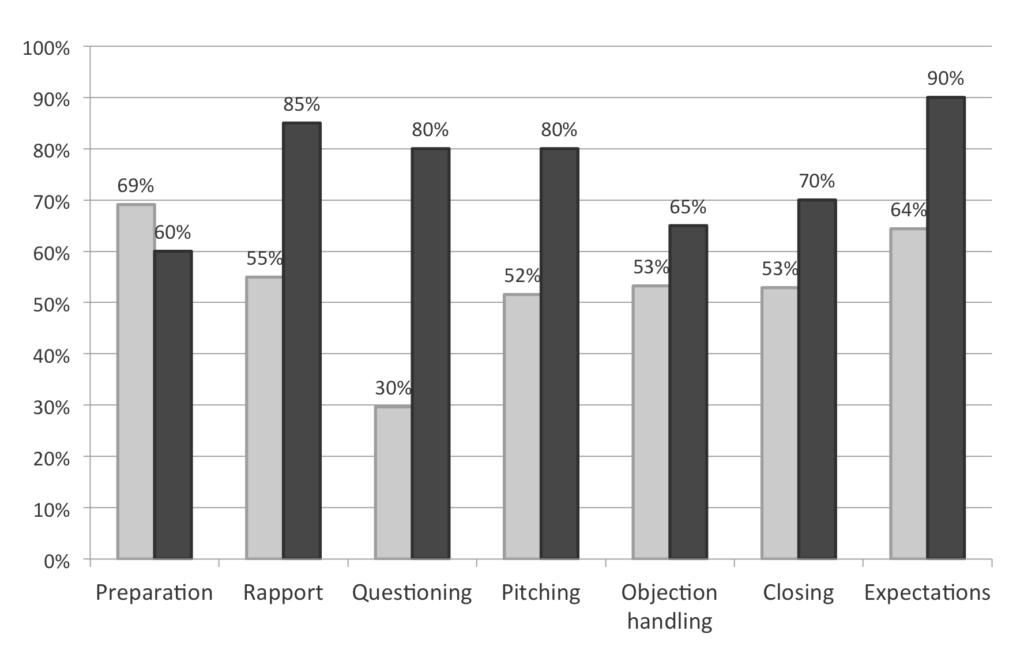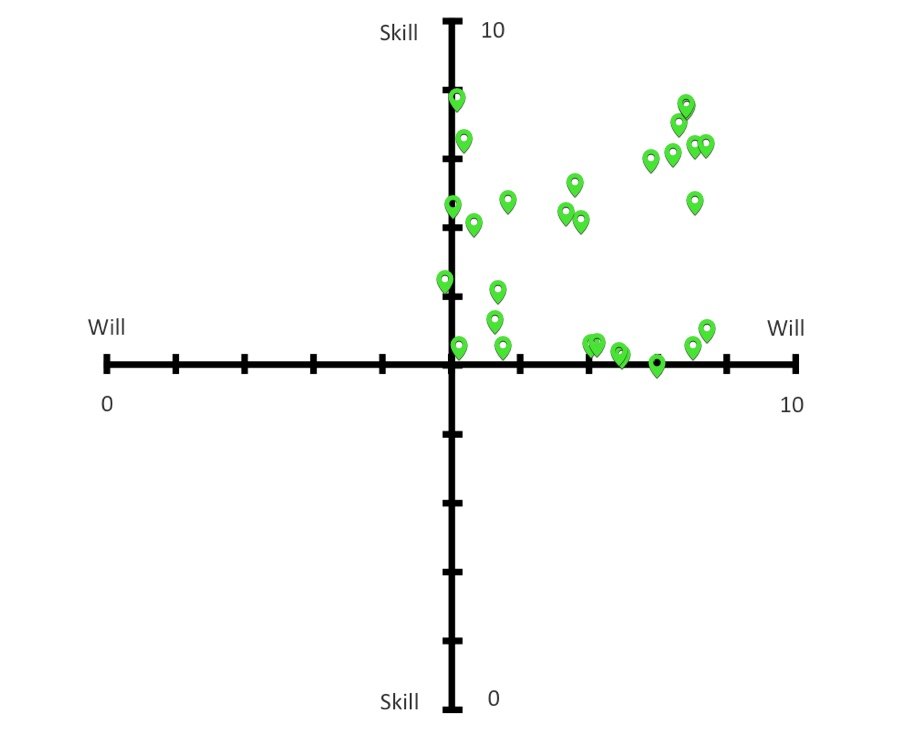Optimism Bias in Sales People
The optimism bias (also known as unrealistic or comparative optimism) is a cognitive bias that causes a person to believe that they are less at risk of experiencing a negative event compared to others. For sales people that negative event is them not achieving their sales quota. In Salestrong sales training courses we always ask the delegates how they perform in relation to the average sales person in the room.
All above Average?
You don’t have to be a maths genius to know that all of the people in the room can’t be above the average. Statistically speaking half of the people in the room should be below average and half above. Sales is probably one of the most measured careers. It’s normally very easy to see who is hitting targets and who is not. It is equally easy to see how this relates to your fellow sales team.
Salestrong asked 110 sales people to rate their ability to sell, from 1 (low) to 10 (high) with 5 being the average in the room. The results for this team were as had been predicted, they all felt that they were above average sales performers, as you can see in the poll below. But this is of course statistically impossible!

Optimism Bias in Sales Managers
Perhaps more worrying is the bigger gap between what their sales managers, reported when sales coaching and what Salestrong sales coaches saw happening in the field:
The sales managers are represented in black and the Salestrong sales coaches are in light grey.
Could this optimism gap have been because the sales managers did not really know what their sales people were doing and how they were actually performing? We certainly know that sales coaching is not used as much as it should be. Or could it be that they also suffered from the optimism bias, on behalf of their teams? Were they in a place where they wanted their teams to appear to be better than they were?
Why Are Sales People So Optimistic?
There are two potential reasons why sales people are particularly prone to the optimism bias:
- Self-enhancement
Self-enhancement happens when it feels good to think that positive events will happen. Sales people are able to control their anxiety and negative emotions more easily if they believe that they are better than other sales people. Sales people then tend to focus on finding information that supports this view, rather than challenging that view. Therefore sales people will see events more favourably for themselves, because that is what they want the outcome to be. - Self-presentation
Self-presentation happens when sales people want to create a certain personal image in social situations. Sales people are inclined to present themselves to others, customers and colleagues, in a good light. Certainly with customers, this is essential for building trust and closing the sale. But academic research tells us that this is not always through conscious effort. In a skill based study where participants believed their driving skills would be tested, people who believed they were to be tested had less optimistic bias and were more modest about their skills than individuals who would not be tested. Pessimistic studies also suggest that sales people who present themselves in a pessimistic and more negative light are generally less accepted by the rest of society. This would obviously have a negative effect on sales and would be managed accordingly.
Can Optimism be Harmful?
We’ve already seen that optimism is essential for sales success. It helps to handle the rejection associated with selling, and it also helps to build trust more quickly. But the same optimism can be harmful when it prevents sales people from seeing their gaps. Here’s a selection of 110 sales people rating their capability after having been trained in a specific set of skills:
It’s easy to see that their perception is optimistically biased as nobody falls below 5 on either skill or will. This particular data was polled at the start of a review session. The findings of the coaches was that the capability was significantly less than the sales people had predicted. Similarly the lack of capability stemmed from the lack of desire to actually execute the skills in the field.
Can the Optimism Bias Be Altered or Eliminated?
This is a very subjective question and the easy answer is yes and no. Yes the optimism bias can be altered in some sales people and the techniques for doing that are to:
- Challenge their world view with credible, real life data and examples
- Create an environment that is safe enough for them to be able to admit their challenges and weaknesses
- Coach regularly with the coaches attuned to the optimism bias in sales people
Some people will not respond to these interventions and the anecdotal experience of Salestrong is that 1 in 12 sales people cannot respond positively to their world view being challenged. Exit strategies should be considered in these situations.
Conclusion
We need optimistic sales people, as without optimism they would surely fail. Optimism is, however, a double edged sword. Over optimism can be harmful as it can impede their ability to see their own gaps and therefore develop. This has consequences at the individual and company level. Strategies are needed in sales organisations to ‘challenge’ sales people in a way that retains their optimism whilst reflecting reality.



